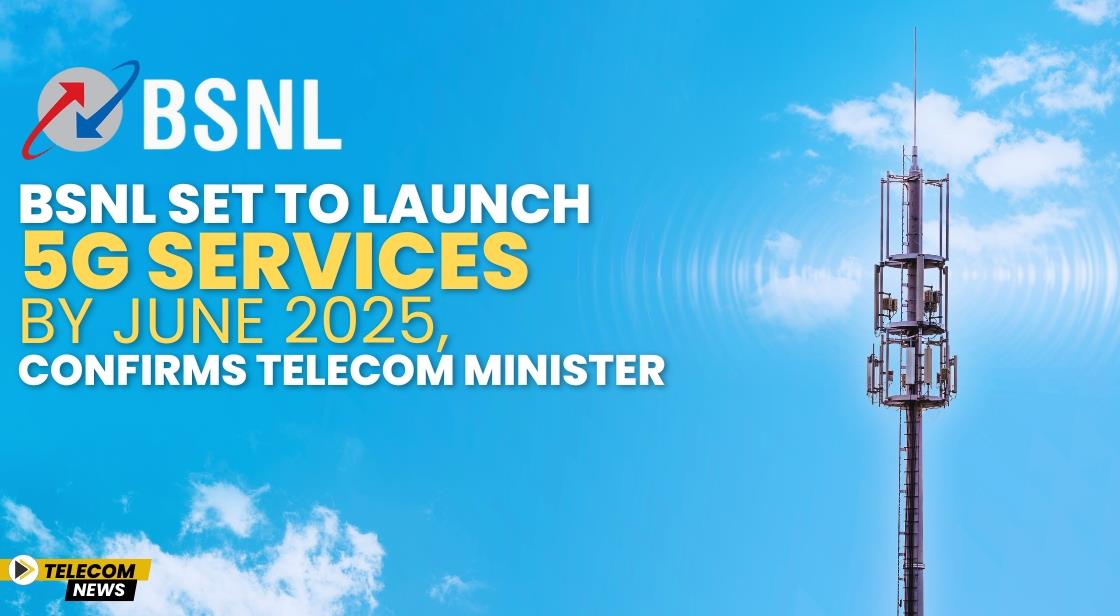BSNL Set to Launch 5G Services by June 2025, Confirms Telecom Minister

News Synopsis
Telecom Minister Jyotiraditya Scindia has confirmed that Bharat Sanchar Nigam Limited (BSNL), the state-owned telecom operator, will launch its 5G services by June 2025. Speaking at the US-India Strategic Partnership Forum, Scindia emphasized that the rollout will be the culmination of a large-scale upgrade from 4G to 5G, marking a significant leap for India’s telecom infrastructure.
BSNL’s 4G Network Expansion and Transition to 5G
According to Scindia, BSNL is set to complete the deployment of its indigenously-developed 4G network across 1 lakh base stations by the first half of 2025. Following the full 4G rollout, BSNL will switch to 5G services. This step will elevate India to a global leadership position, as the country will be one of only six nations to successfully transition to 5G using homegrown technology. The minister highlighted that BSNL’s 5G journey will be achieved without reliance on foreign equipment, aligning with Prime Minister Narendra Modi’s vision of self-reliance in telecommunications.
Indigenously Developed 4G Technology
The foundation of BSNL’s 5G rollout is its locally-developed 4G network, which has been created in partnership with the Centre for Development of Telematics (CDoT) and Tata Consultancy Services (TCS). This collaboration underscores India’s push for domestic technological solutions in critical sectors like telecommunications. The government has been adamant that BSNL will utilize only indigenous technology, reinforcing India’s commitment to building a self-sufficient telecom ecosystem.
Scindia noted that BSNL already has a functional core network and radio access network (RAN) in place. As of October 13, BSNL had operationalized 38,300 sites, and plans are in motion to expand this to 1 lakh sites by April-May 2025. This aggressive expansion is expected to position BSNL for a smooth transition to 5G, ensuring widespread connectivity across the nation.
India’s Global Leadership in 5G Deployment
India’s ambitious 5G goals have positioned the country as a leader in global telecom innovation. According to Telecom Minister Jyotiraditya Scindia, the nation has achieved the fastest 5G rollout in the world. In just 22 months, Indian telecom companies have installed 4.5 lakh 5G towers, covering 80% of the country’s population. This rapid deployment reflects the country’s commitment to leveraging next-generation technologies to drive economic growth, enhance digital connectivity, and improve access to services for millions of people.
Scindia’s comments came amidst widespread efforts by private telecom operators to expand 5G networks across India. Companies like Jio and Airtel have already made significant strides in delivering 5G services, providing ultra-fast internet speeds and advanced connectivity to both urban and rural areas.
Strategic India-US Cooperation on Technology
During his address at the US-India Strategic Partnership Forum, Scindia also touched on the strengthening of ties between India and the United States, particularly in the area of technology and defense. He revealed that the two nations have reached an agreement where India will supply chips to US-based defense companies. This partnership reflects the deepening technological and economic relationship between the two countries, as well as India’s growing role as a supplier of key components in the global supply chain.
This agreement is especially significant as it comes during a time when the global semiconductor industry is grappling with supply chain disruptions. India’s emergence as a reliable partner for the US in this space marks an important step in diversifying the global semiconductor supply chain and reducing reliance on traditional manufacturing hubs.
Ethical Considerations for AI Deployment
In addition to the 5G and telecom developments, Scindia highlighted the importance of ethical considerations and robust regulatory frameworks for the deployment of artificial intelligence (AI) systems. He stressed that AI governance must not be an afterthought and should be grounded in principles that ensure privacy protection, transparency, and fairness.
The minister warned of the potential risks posed by AI technologies, including issues of privacy invasion and bias, which could negatively impact marginalized communities. Scindia called for proactive regulations to mitigate these risks and ensure that AI’s transformative power is harnessed for the public good. His comments align with global conversations on the responsible use of AI and the need for oversight to prevent misuse.
India’s proactive stance on AI ethics is particularly timely, given the growing importance of AI in sectors like healthcare, finance, and governance. As AI systems become increasingly integrated into daily life, concerns about data privacy, algorithmic bias, and the transparency of decision-making processes have become more prominent. By prioritizing ethical AI deployment, India aims to set a global example of responsible technology adoption.
Conclusion
BSNL’s planned 5G rollout by June 2025, under the leadership of Telecom Minister Jyotiraditya Scindia, represents a significant milestone in India’s telecommunications sector. The use of indigenously developed 4G and 5G technology, along with the rapid expansion of telecom infrastructure, underscores India’s ambition to lead in global technology innovation. Additionally, the deepening India-US partnership on defense technology and the emphasis on ethical AI deployment reflect the country’s broader commitment to leveraging cutting-edge technology responsibly while positioning itself as a major player on the global stage. As India continues to expand its digital infrastructure, these initiatives will have far-reaching impacts on the economy, connectivity, and technological leadership.
You May Like









